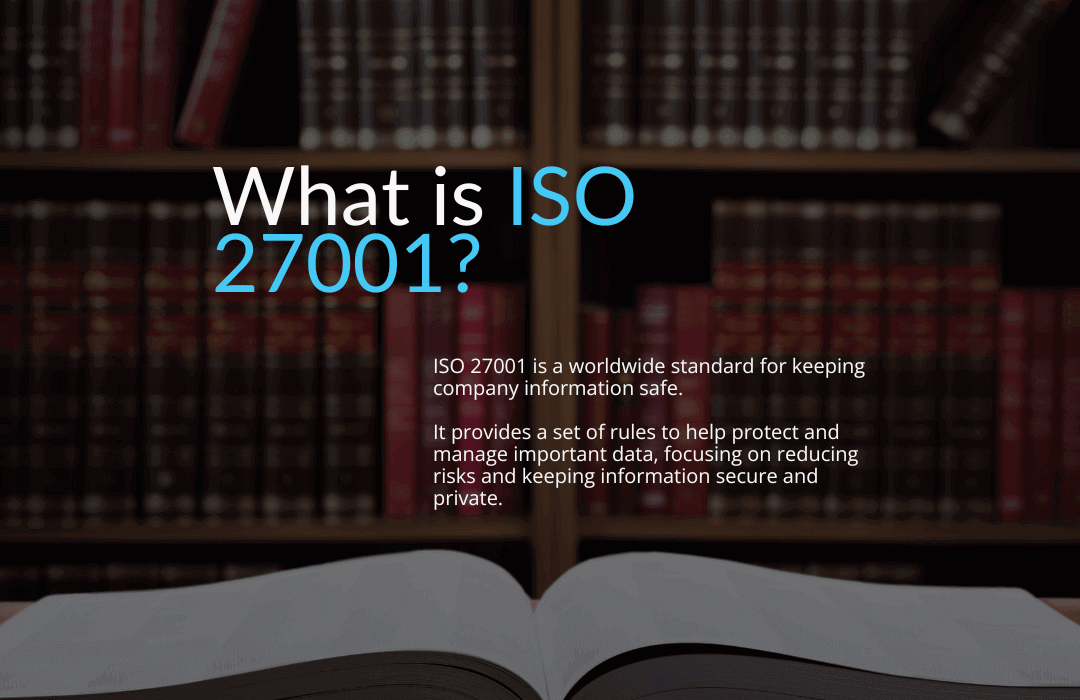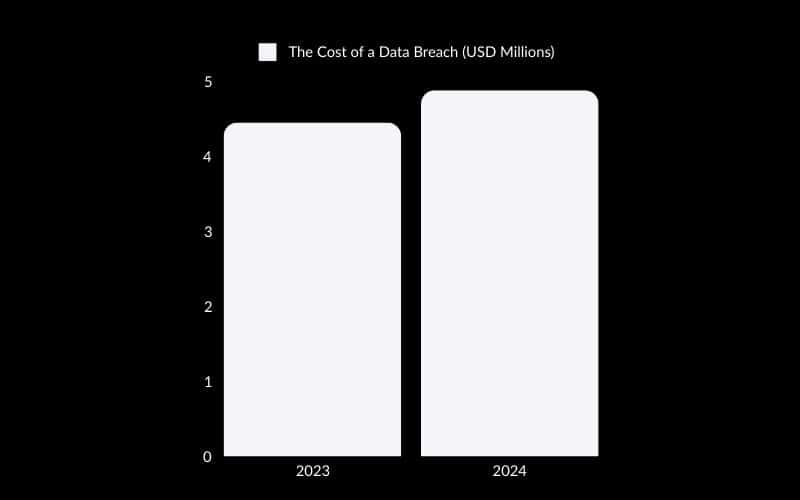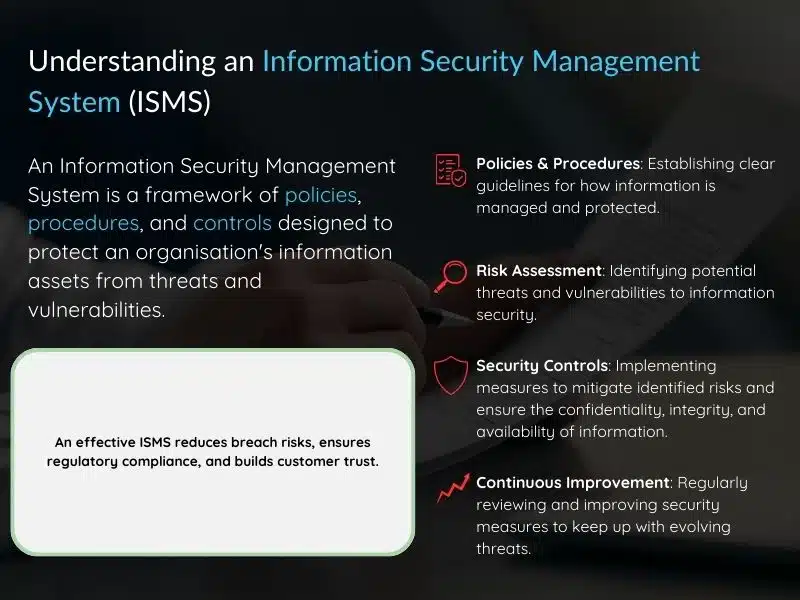Business data is like a treasure for cyber criminals.
In fact, buried in almost every organisation’s information assets are details worthy of holding ransom.
So, how do you protect it?
With ISO 27001 certification.
ISO 270001 is more than just a standard industry requirement; it’s a globally recognised framework of ISO that elevates your cyber security.
It aims to protect your internal business data while ensuring the security of your customer’s sensitive information.
Now, you might be thinking “Is this certification really for me?”, or “How does this apply to my business?”
Well, we’re here to break it down for you.
We’ll dive into the what, why, and how of ISO 27001 certification in Australia.
This guide is designed to be your go-to resource for understanding how this information security standard can be a game changer for your business.
Key Takeaways
-
- ISO 27001 is the leading global standard for managing and securing information assets, providing a structured framework for implementing an Information Security Management System (ISMS).
- Achieving ISO 27001 helps reduce risks by identifying vulnerabilities, implementing security controls, and ensuring business continuity, making your organisation more resilient against threats.
- Certification serves as a mark of trust, showing customers and stakeholders that your company is committed to information security, providing a significant competitive advantage.
- The approach integrates people, processes, and technology, fostering a company culture where every employee contributes to protecting sensitive data.
- ISO 27001 helps businesses meet compliance requirements for data protection, simplifying the process of proving compliance to regulators and stakeholders, which can save time and resources.
What is ISO 27001?
ISO/IEC 27001 is an internationally recognised standard – and the gold standard – for managing and securing your business’s data. It forms a key component of your cyber security strategy.
But what does it do?
In short, ISO/IEC 270001 provides a systematic approach and framework for establishing, implementing, maintaining, and continually improving an Information Security Management System (ISMS). An ISMS helps your business manage the security of confidential information and reduce risks related to confidentiality, integrity, and availability.
ISO 27001 outlines the requirements of ISO to ensure your company follows best practices in information security management.
The beauty of ISO 27001 lies in its flexibility. Whether you’re a start-up or a large corporation, this standard matches your specific needs.
It’s not a one-size-fits-all solution, rather it helps protect your business with your specific requirements in mind.
And ISO certification isn’t just about using the right technology in to protect your business. It’s an all-inclusive approach integrating people, processes, and technology. It’s about creating a culture in your business where every employee becomes a guardian of sensitive data and personal information.
Is ISO 27001 Certification Mandatory?
It’s not legally mandatory, however, it’s often a market requirement and is recognised globally as a best practice in information security.

Benefits of ISO 27001 Certification for Australian Companies
So, what are the benefits? Why should your business care about ISO 27001 certification?
It’s not just a tick box. There are real, tangible advantages to implementing this global standard.
Implementing ISO 27001 provides a significant competitive advantage and helps your business meet stringent data security standards.

ISO Certification Increases Your Credibility and Trust
We’ve seen some big businesses suffer cyber-attacks. Optus, Latitude, DP World. We could go on.
These events are making headlines – so customers have become more tech-savvy and security-conscious than ever.
Showing that you have ISO 27001 certification is like having a five-star review for your cyber security. It tells customers, business partners, potential clients, and other interested parties that you take security seriously. It can also be an important factor for companies working with the Australian government, where strong information security measures are often required.
Competitive Edge
In a crowded market, standing out is a challenge. ISO 27001 gives you a leg up. It positions you as a leader that acknowledges information security risk. ISO 27001 is a statement that your business is ahead of the curve and ready to compete on the global stage.
Risk Management
Risk reduction is one of the major benefits of ISO 27001. By meeting ISO requirements, you’re actively engaging in a process that protects your business from threats, both seen and unforeseen, ensuring privacy protection and comprehensive data security.
Firstly, ISO 270001 can help defend your business from potentially crippling data breaches. The ISO 27001 process helps you identify potential threats and vulnerabilities and take steps to mitigate them using effective security controls.
This pre-emptive approach significantly lowers your risk of a breach, but also leaves you in good footing should one occur.
This is because ISO 27001 helps you establish a business continuity plan, preparing your organisation for any eventuality with cyber and environmental management. This means your business stays up and running no matter what.
Financial implications are also a critical part of risk reduction. The cost of a data breach isn’t limited to lost data; it includes legal fees, fines, and potential loss of business. ISO 27001 not only helps you avoid these costs but can also lead to reduced insurance premiums.
Finally, let’s not forget about reputation. Like trust, it takes years to gain and seconds to damage. By minimising risks, ISO 27001 plays a pivotal role in your business’s reputation management.
Maintaining a strong security posture through this certification reassures customers and stakeholders that your business is reliable and trustworthy.
Improved Process and Efficiency
ISO 27001 certification isn’t just a move towards securing data, it’s also an excellent framework for improving your business processes.
When you implement the standards required for this certification, you’re essentially conducting a thorough audit of your existing operations. This review leads to the identifications of inefficiencies and redundancies in your processes. Addressing these helps streamline your workflows and improve operational efficiency.
Compliance
Data protection laws and regulations are constantly changing, and keeping up can be a challenge.
This is a real strength of ISO 27001, as it prepares you to meet both current and future compliance requirements. By aligning with ISO management, you’re aligning with a global standard that resonates with various data protection regulations.
This simplifies the process of demonstrating your compliance to regulators and stakeholders, saving you time and resources that would otherwise be spent navigating the compliance landscape.
Employee Engagement
ISO 27001 certification involves every layer of your organisation. It’s not just a top-down initiative; it necessitates a shift in culture and mindset towards strong security practices.
Incorporating ISO training into your employee development programs is crucial. It ensures all staff are equipped with the knowledge and skills to uphold the standards set by ISO 27001. This training can take various forms, but increasingly businesses are turning to online training models.
By integrating online training into your ISO training strategy, you’re not only facilitating the spread of critical information security knowledge throughout your business; you’re also promoting an environment of continual improvement.
This approach enhances employee engagement. When team members have easy access to learning resources and can see the practical relevance of their training, they’re more likely to take ownership of their role in protecting company data.
How do I get ISO 27001 Certification?
Achieving ISO 27001 may seem daunting at first. But, it’s a straightforward process when broken down into manageable steps. Here’s a simplified roadmap to help guide you through.
- Understand the Standard: Before anything else, you’ll want to be familiar with what ISO 27001 entails. This isn’t just about the technical aspects either; it’s about understanding the ethos – a commitment to information security.
- Gap Analysis: Assess your current information security practices against the ISO 27001 requirements. The gap analysis will highlight areas needing improvement and help you plan your approach.
- Develop an ISMS: An Information Security Management System (ISMS) is the core of ISO 270001. This system encompasses policies, procedures, and controls that address both the technical and organisational aspects of information security.
- Implement Changes: Based on your gap analysis, start the implementing the necessary changes. This could involve revising existing policies to your management system, introducing new security measures, or enhancing employee training programs.
- Employee Training & Awareness: Ensuring that all employees understand their role in maintaining the ISMS is crucial.
- Internal Audit: Conduct an internal audit to test the effectiveness of your ISMS. This audit should identify any inconsistencies or areas for improvement before the external audit.
- Choose a Certification Body: For the actual certification, you’ll need to choose an accredited certification body. Make sure it’s a recognised and respected in your industry and region.
- External Audit: ISO certification providers will conduct an external audit. If your ISMS meets the standards, they’ll recommend your for certification.
- Continuous Improvement: Note, ISO 27001 certification is not a on and done event. It requires continuous monitoring and improvement of your ISMS to stay compliant.
- Recertification: ISO 27001 certification is valid for three years. After this time has lapsed, you will need to undergo a recertification audit to maintain your certification status.
How Long Does The Process Take?
The answer: it depends.
The certification process will vary depending on a number of factors, including the size of and complexity of your business, the current maturity of your information security practices, and how many resources are available.
Here’s an overview:
Initial Preparation and Understanding
This phase involves getting to grip with the ISO 27001 standard and can take a few weeks to a couple of months. It includes training, conducting a gap analysis, and beginning to understand what changes are necessary for your business.
Developing an ISMS
Again, this process can vary. For smaller organisations, this could take 3-6 months, while larger, more complex businesses may need 6-12 months. This phase includes drafting policies, implementing new processes, and making system changes.

Implementation and Employee Training
This step is crucial and can take some time depending on the scope of changes and the training methods. This phase might last a few months.
Internal Audit
Once your ISMS is implemented, you will need to conduct an internal audit. This can take a few weeks to a month.
Pre-Assessment and Rectification
Some organisations opt for a pre-assessment audit by an external body to determine if there are any remaining gaps. This is followed by rectification of identified issues, which can add a few weeks to the timeline.
External Audit and Certification
The conformity assessment itself may take a few days to a week. However, the scheduling and process of obtaining final certification can extend over several weeks.
For many organisations, the process can take anywhere from 6 months to over a year from start to finish. It largely depends on your:
-
- organisation size and complexity
- current level of compliance
- resource allocation
- employee training and engagement
- internal and external audit schedules
- response to audit findings
It’s a commitment, but the time invested can bring many long term benefits to your business, as mentioned above.
Don't miss out on our latest.
Join our subscribers and receive expert insights on cyber security and IT. Sign up now!
How Much Does ISO 27001 Certification Cost?
Costs can vary widely depending on several factors. It’s difficult to provide a one-size-fits-all figure, but here are some key elements that influence the cost.
- The Size and Complexity of your Organisation: Larger organisations with more complex operations and greater head count will typically face higher costs due to the increased scope of the audit and complexity of implementing an ISMS across multiple departments.
- Current State of Information Security: If your organisation already has solid information security practice in place, your costs may be lower. However, if you’re starting from scratch, or significant changes are required to realign with ISO 27001, the costs can be higher.
- Consultancy Fees: If your organisation opts to hire ISO consultants to help navigate the certification process. Naturally, you’re hiring a team of experts a higher fee is required, however it can depend on the consultant’s expertise and level of assistance required.
- Internal Resource Allocation: The time and resources your internal team spends on achieving certification is also a cost factor. This includes time spent on developing and implementing the ISMS, conducting internal audits, and maintaining the system.
- Certification and Audit Fees: The external audit conducted by a certification body incurs fees. Again, these fees will depend on your business’s size and the audit process’s length.
- Maintenance Costs: After certification, there will be ongoing costs associated with maintaining and improving your ISMS. This includes regular internal audits, possible consultancy fees for ongoing improvements, and recertification costs every three years.
Conclusion
ISO 27001 certification is essential for businesses in Australia looking to protect their data and gain a competitive edge.
This guide has outlined the steps, benefits, and significance of the certification.
In the age of information security, ISO 27001 is not just a compliance measure, but a strategic tool for building trust, ensuring resilience, and supporting your business’s growth.
Start Your ISO 27001 Certification Journey with Stanfield IT
More Like This
Windows 10 End of Life (EOL) and What it Means
Microsoft has announced that October 14, 2025, will be the End of Life (EOL) date for Windows 10. Windows 10 EOL is set to affect all versions of Windows 10, including Home, Pro, Education, and Enterprise. Research from Lansweeper indicates that only 23.1% of...
Cyber Hygiene For Business: What You Need To Know
Implementing cyber hygiene practices is one of the most effective ways to protect your business from cybersecurity risks. As a business owner, the security of your company's data is paramount. With the prevalence of cyber-attacks in the modern world, it’s increasingly...
11 Great Firewall Features (2024 Update)
A firewall should be part of your overall cyber security mitigation strategy. You may think that because you’re not a big bank or Apple your business is safe from hackers, right? Unfortunately not. Many hackers actually target small-to-medium businesses because they...



